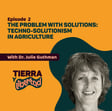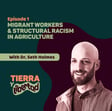
Episode 3: Une sortie du capitalisme par la terre
Dans cet épisode, je reçois Tanguy Martin. Agronome de formation, Tanguy est aussi un militant engagé de longue date sur des questions cruciales comme l’accaparement des terres, l’agroécologie et l’alimentation durable, à différentes échelles du local à l’européen. Il est impliqué dans plusieurs collectifs, dont Ingénieur·e·s sans frontières et Reprise de terres, et travaille depuis une quinzaine d’années avec Terre de Liens, une organisation qui accompagne l’accès au foncier agricole.
Notre échange s’appuie notamment sur son essai "Cultiver les communs. Une sortie du capitalisme par la terre". Dans ce livre, Tanguy revient sur le rôle fondamental que l’appropriation de la terre a joué dans la naissance du capitalisme et sur les effets destructeurs que cette logique continue de produire sur les sociétés, les écosystèmes et les droits humains. En contrepoint, il explore la piste politique des communs, et en particulier ce que cela implique de penser la terre non plus comme une propriété, mais comme un commun à instituer collectivement.
👋 Let's connect!
✊Soutenez-nous: https://fr.tipeee.com/tierra-y-libertad-podcast
📝 Notes de l’épisode:
Collectif pour une sécurité sociale de l'alimentation
Mouvement des Sans Terre (MST)
“Reprendre la terre aux machines”, l'Atelier Paysan:
“De la démocratie dans nos assiettes – Pour une sécurité sociale de l’alimentation”, de Tanguy Martin et Sarah Cohen
“Quotidien politique", de Geneviève Pruvost



